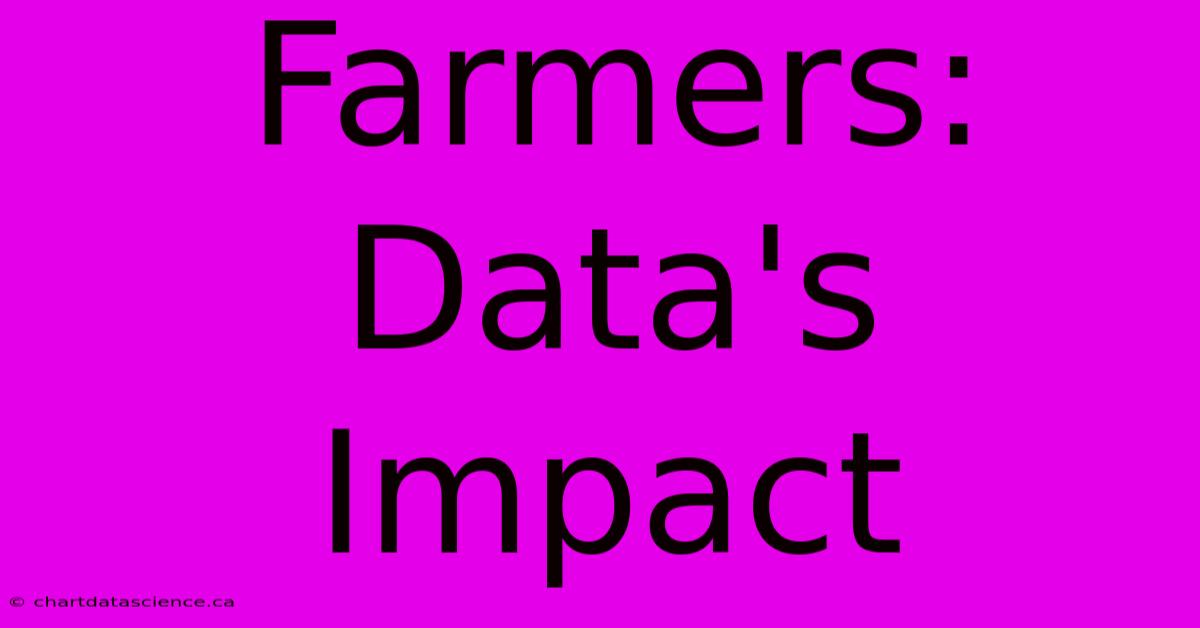Farmers: Data's Impact

Discover more detailed and exciting information on our website. Click the link below to start your adventure: Visit My Website. Don't miss out!
Table of Contents
Farmers: Data's Impact on Modern Agriculture
The world's food supply depends heavily on the success of farmers. Historically, farming relied on experience, intuition, and a bit of luck. Today, however, data is revolutionizing agriculture, empowering farmers with unprecedented insights to optimize yields, manage resources efficiently, and ultimately, enhance food security. This article explores the profound impact of data on modern farming practices.
The Data Revolution in Agriculture
The rise of precision agriculture is at the heart of this transformation. This data-driven approach leverages various technologies, including:
-
GPS and GIS: Precise location tracking allows for targeted application of inputs like fertilizers and pesticides, minimizing waste and maximizing efficiency. Geographic Information Systems (GIS) provide a visual representation of fields, enabling better understanding of soil variations and crop health.
-
Sensors and IoT: Sensors embedded in the soil or attached to machinery collect real-time data on soil moisture, temperature, nutrient levels, and crop growth. The Internet of Things (IoT) connects these sensors, transmitting data to farmers' devices for analysis and decision-making.
-
Remote Sensing and Drones: Drones equipped with high-resolution cameras and multispectral sensors capture aerial images and data about crop health, identifying areas of stress or disease early on. Satellite imagery offers a broader perspective, providing insights into large-scale patterns and weather conditions.
-
Machine Learning and AI: Sophisticated algorithms analyze the vast quantities of data collected, identifying trends and patterns invisible to the human eye. This predictive analytics helps farmers make informed decisions regarding irrigation, fertilization, and pest control. AI-powered robots are even emerging to automate tasks like planting and harvesting.
Key Benefits of Data-Driven Farming
The integration of data into farming practices offers numerous benefits:
Increased Efficiency and Productivity
Optimized resource management is a key outcome. Data allows for precise application of resources, reducing waste and maximizing the return on investment. This translates to higher crop yields and increased profitability for farmers.
Improved Crop Quality and Yield
Early detection of diseases and pests, facilitated by data analysis, allows for timely intervention, preventing significant crop losses. Data-driven irrigation ensures crops receive the optimal amount of water, improving their quality and yield.
Reduced Environmental Impact
Precision agriculture minimizes the use of fertilizers and pesticides, reducing their environmental impact. Optimized irrigation conserves water resources, contributing to sustainable farming practices.
Enhanced Decision-Making
Data provides farmers with real-time insights, empowering them to make well-informed decisions quickly and effectively. This proactive approach improves overall farm management and minimizes risks.
Better Risk Management
By monitoring various environmental factors and crop conditions, farmers can better anticipate and mitigate risks, such as droughts, floods, and disease outbreaks. Predictive analytics helps in proactive planning and risk management.
Challenges and Considerations
While the benefits are substantial, the adoption of data-driven farming presents some challenges:
- High initial investment: The technology involved can be expensive, requiring significant upfront investment.
- Data management and analysis: Managing large datasets and interpreting complex information requires expertise and resources.
- Digital literacy: Farmers need access to training and support to effectively utilize data-driven technologies.
- Connectivity issues: Reliable internet access is crucial for data transmission and analysis, particularly in remote areas.
The Future of Data in Agriculture
The future of agriculture is undoubtedly intertwined with data. As technology continues to advance and become more accessible, the use of data in farming will only grow more sophisticated and widespread. This will lead to greater efficiency, sustainability, and food security for the world. The integration of data analysis with other emerging technologies like blockchain and genetic engineering promises even more transformative advancements in the years to come. The journey towards a truly data-driven agricultural sector is ongoing, but the potential benefits are immense, shaping a more resilient and productive food system for future generations.

Thank you for visiting our website wich cover about Farmers: Data's Impact. We hope the information provided has been useful to you. Feel free to contact us if you have any questions or need further assistance. See you next time and dont miss to bookmark.
Also read the following articles
| Article Title | Date |
|---|---|
| Data A Farmers New Tool | Dec 26, 2024 |
| Disappointing Squid Game 2 Review | Dec 26, 2024 |
| New Balance 55 Off All Day Comfort | Dec 26, 2024 |
| Manchester City Vs Everton 1 1 Premier League | Dec 26, 2024 |
| Kohlis Wrongdoing No Ban For Cricket Star | Dec 26, 2024 |
